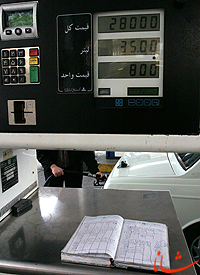A member of the same committee, Seyed Abdolmajid Shoja", told Irna that due to the negative social consequences of this plan, members of the committee are working to stop it.
"Corruption, rent-seeking and social pressures on car owners are among the unacceptable outcomes of this initiative," he said.
Shoja" noted that more than two million gasoline smart cards have not yet been issued, and 400 stations have not been equipped with POS (Point of Sale) devices.
Another top MP said Monday that
The plan, aimed at reducing the lavish subsidies that keep petrol prices low, should be put off as the technology to enforce the rationing is not ready, the head of parliament"s Energy Committee, Kamal Daneshyar said.
"Based on the studies of our committee the ground is not ready to implement the rationing using smart cards, so we have to give another chance to the government," said Daneshyar.
"We have received reports that the devices for reading the smart cards break down quickly and some pumps end up working backwards. This means that instead of pumping petrol they suck up the petrol from the vehicles," he added.
"Therefore until these problems are addressed, the rationing project has to be postponed until around end of September," he concluded.
The lavish consumption by Iranian drivers, encouraged by the subsidized prices that work out less than a comparable amount of mineral water, forces OPEC"s number two producer to import billions of dollars of extra petrol annually.
The government has yet to confirm whether the plan will be delayed but after such explicit comments by the head of the committee that drafted the legislation it appears unlikely the plan can go ahead on time, commented AFP.
There is a consensus in
Economists have also warned that the rises in petrol prices could further stoke inflation in
Tehran has been abuzz with talk about the change with advertisements in newspapers and television urging people to obtain the smart cards to buy their petrol.
The liberal use of the motor car encouraged by the cheap prices has also caused some of the region"s worst traffic congestion in
However Iranian Deputy Petroleum Minister Mohammad Reza Nematzadeh denied that the government was looking for a way out of the plan, saying that the billions spent on petrol imports meant the move was overdue.
"In addition to the 44.5 million liters of petrol produced in Iran, last year we imported five billion dollars of gasoline. If the rationing is not implemented this year we are faced with importing 9.5 billion dollars worth of petrol."
He said that in the last Iranian year ending March 2007, 74 million liters of petrol was consumed per day and the government expected this figure to rise to around 81 million liters per day.
Under the plan approved by the Iranian parliament in early March, Iranian motorists will have to pay a higher price for any petrol they buy above a certain rationed quota.
The quota has yet to be defined by the government.


Your Comment